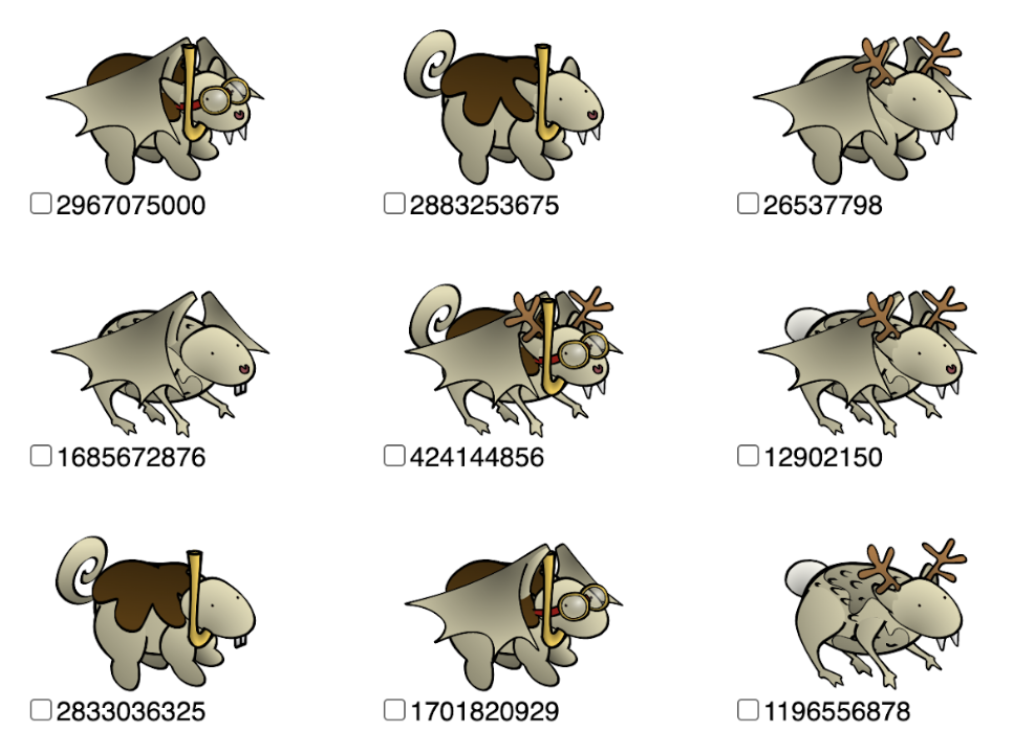July Newsletter
Greetings from the Agoric crew, normally centered at Palm House in Belmont, but geographically decentralized for the time being.
Hackathons are important to what we do at Agoric. We regularly sponsor them. This month we took a different spin on the classic hackathon: We did an internal one. We recognized that doing our own internal hackathon where we were the participants, rather than the sponsors, would be beneficial for various reasons, among them: learning what our users experience, getting better at our own tools, and ultimately improving our offering. More details on our “eat your own dog food” experience down below. Meanwhile, though, here’s a tantalizing image of one of the internal projects we worked on, the Agorables: non-fungible tokens with hidden, recombinable genomes.

We hope this note finds you and yours well in these challenging times.
. . .
Updates: What’s Happening at Agoric
Engineering Updates
- We reached the SES 0.9 milestone, which expands the set of npm packages that can run in SES’s “powerful” starting compartment to include those that make use of the V8 Error stack trace API, notably some testing frameworks. SES 0.9 also includes machinery (non-enumerable lexical dependency injection) that will allow Agoric to meter smart contracts, limiting denial of service attacks.
- The entire company and a few guests participated in an internal hackathon to really dig into our developer experience, documentation, and APIs. We built contracts with Zoe and ERTP for DeFi, pegging, voting, and gaming.
- We incorporated the feedback from the internal hackathon into further Zoe helpers and API improvements that support optional TypeScript types, more readable patterns, and better support for cooperation and composition with multiple contracts.
- Zoe now spawns each new contract in its own, separately-metered vat. This ensures that runaway contracts pay for it, and one contract instance crashing won’t affect other contracts.
Follow Agoric technical updates at https://agoric.com/weekly-updates/
Why the Agoric Team Spent a Week Eating Our Own Dogfood
Agoric COO Mike Jablon on what we learned by doing our own internal hackathon. https://medium.com/agoric/why-the-agoric-team-spent-a-week-eating-our-own-dogfood-3006300a7efc
Go Inside a Computational Microeconomics Summer Camp
Bill Tulloh, economist here at Agoric, spoke at length with the distinguished economics professor Kevin McCabe of George Mason University for a three-part series, including the role of our smart contract platform in his summer program. https://medium.com/agoric/kevin-mccabe-on-the-inner-workings-of-computational-microeconomics-27caf66e20f6
McCabe Interview Part 2
What Is Experimental Economics? https://medium.com/agoric/computational-microeconomics-part-2-what-is-experimental-economics-da403ff7d76b
McCabe Interview Part 3
Smart Markets in Action https://medium.com/agoric/computational-microeconomics-part-3-smart-markets-in-action-a34598e39d6d
. . .
Events: Upcoming Events in Which We’re Participating
All scheduled events we were planning on have been postponed, naturally, or are taking place remotely.
TC39: September 21 - 24
. . .
Bookmarks: What We’re Reading
What Explains the Rise of AMMs?
DeFi is presenting opportunities for many new applications, and AMMs (automated market making) as a category is growing fast and attracting tons of attention. Haseeb Qureshi has written a compelling article that describes AMMs, particularly Uniswap, discusses what’s driving this phenomenon, and explores future growth and changes. (Dean Tribble) https://medium.com/dragonfly-research/what-explains-the-rise-of-amms-7d008af1c399
Why Decentralized Platforms Matter
Platform-based businesses, enabled by the open Internet, have been tremendously successful, but the increasing returns dynamics often lead to centralization. Smart-contract platforms, built on open-source software, and public blockchains promise a way to decentralize the platforms and reinvigorate entrepreneurial opportunities. Creators of decentralized platforms can learn much from how more centralized platforms grew, and the problems they have had to overcome. A recent book, Platform Revolution: How Networked Markets are Transforming the Economy and How to Make Them Work for You by Geoffrey G. Parker, Marshall W. Van Alstyne, and Sangeet Paul Choudary, combines a nice mix of the theory, practice, and strategy behind the growth of platform-based businesses. It provides sound advice and ample case studies on challenges that decentralized platforms will need to overcome. (Bill Tulloh) https://wwnorton.com/books/Platform-Revolution
Catastrophic Risks: What’s the Worst That Could Happen?
This briefing reviews low probability risks that governments tend to ignore. A couple of examples include: a big enough Coronal Mass Ejection (CME) from the sun, which could cause chaos for our electrical dependent grid lives; or a volcanic super-eruption, which could bring civilization to an end. These low-probability catastrophic events are tough to take seriously but so was a worldwide pandemic virus like COVID-19. I read this with a mind of how can I be best prepared, if at all, for any other future blindsided events. (Vanessa Pestritto) https://www.economist.com/briefing/2020/06/25/the-world-should-think-better-about-catastrophic-and-existential-risks
. . .
Thanks for Reading
Please feel free to forward. You can join the Agoric community on Twitter, Telegram, and LinkedIn.
